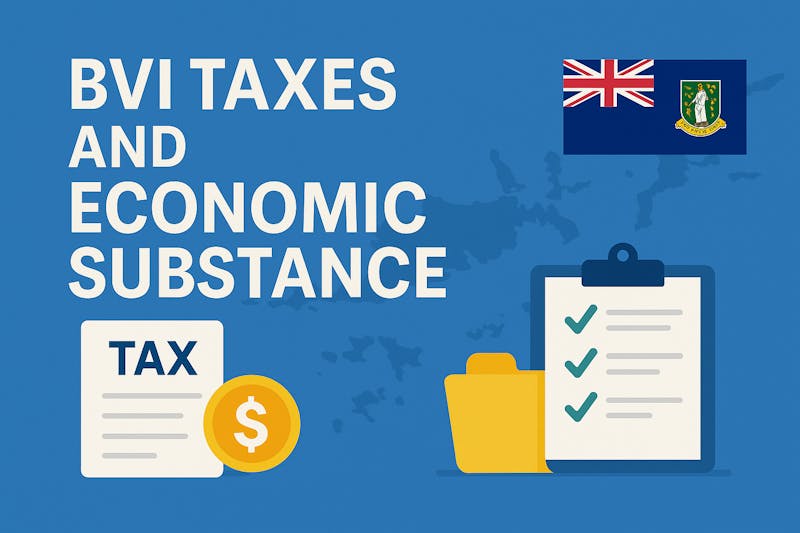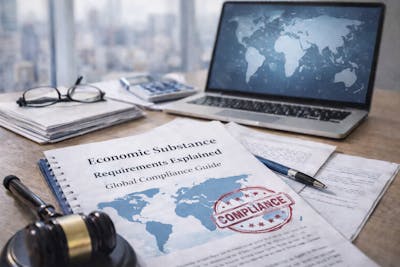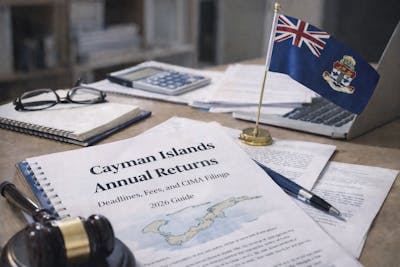Tax residency drives whether an entity must meet Economic Substance (ES) requirements, what it must report within 6 months after its financial period, and whether it can use non-BVI tax residency to be out of scope.
To claim non-BVI tax residency, the Virgin Islands International Tax Authority now requires documentary evidence such as a tax residency certificate, assessment, or return. UAE claims are only valid for periods starting on or after 1 June 2023.
The BVI remains tax-neutral for companies with no corporate income tax and no capital gains tax, but expects payroll tax and other indirect taxes and fees.
From 2024 filings onward, most BVI companies must file a simple financial return with their registered agent within 9 months of year-end (subject to exemptions).
The British Virgin Islands is a well-established offshore jurisdiction with tax neutrality, flexible company law, and global appeal.
Since the Economic Substance (Companies and Limited Partnerships) Act took effect, with current ITA Rules v4 (April 2024), BVI entities face clearer expectations around substance, reporting, and non-resident claims.
Overview of Tax Residency in the BVI Under Economic Substance Rules
The BVI has no statutory definition of “tax residency” outside the Economic Substance (ES) framework. Under the Economic Substance Act and International Tax Authority (ITA) Rules v4 (April 2024), residency determines:
- Whether the entity falls within ES scope
- Reporting obligations to the ITA
- Eligibility to be treated as non-resident (and therefore out of scope)
Any entity claiming non-BVI tax residency must upload evidence via its registered agent into the Beneficial Ownership Secure Search System (BOSSs) database. Acceptable proof includes:
- Tax residency certificate
- Tax assessment
- Filed tax return
ES information must be submitted within 6 months after the financial period end through your registered agent into the BOSSs database.
Clarifications in the 2024 ITA Rules
- A claim of UAE tax residency cannot cover financial periods before 1 June 2023 (start of UAE Corporate Income Tax).
- Crown Dependencies (Jersey, Guernsey, Isle of Man): you must show you are subject to corporate income tax there, not merely incorporated.
- If the claimed jurisdiction has no corporate income tax, the entity cannot be treated as tax resident there for ES purposes.
Tax Residency vs. Resident Status in the BVI
Resident status refers to a company’s legal presence in the BVI, such as incorporation, property ownership, or business registration.
Tax residency under the Economic Substance regime is different. It focuses on where a company is centrally managed and controlled and where its income is actually taxed.
Entities that are tax resident in another jurisdiction not on the EU Annex I (non-cooperative list) may fall outside the ES scope if sufficient evidence is provided.
EU List Context (2025)
As of 18 February 2025, the EU updates Annex I and II about every six months. Entities should closely monitor updates to ensure continued compliance with Virgin Islands International Tax Authority requirements.
Benefits and Opportunities for Businesses in the BVI
The BVI remains one of the most attractive offshore jurisdictions for international businesses. Its tax-neutral framework, coupled with predictable indirect taxes, creates opportunities for companies seeking efficiency, compliance, and global market access.
Tax Neutrality with Targeted Local Taxes
The BVI does not impose corporate income tax or capital gains tax on companies. Instead, the system relies on a limited set of indirect taxes and statutory fees. This structure offers businesses the benefit of light compliance obligations while ensuring predictable costs.
BVI Taxes and Fees
| Item | What to know in 2025 |
|---|---|
| Corporate income tax | None for BVI companies. |
| Capital gains tax | None for BVI companies. |
| Payroll tax | Class 1: 10% (8% employee, 2% employer). Class 2: 14% (8% employee, 6% employer). |
| Hotel Accommodation Tax | 10% on room rate; return due 15 days after month-end; 20% penalty for late filing. |
| Stamp duty on real estate | 4% for belongers, 12% for non-belongers. Applies to property transfers and shares in BVI land-holding companies. |
Why This Matters for Businesses
The absence of corporate and capital gains taxes in the BVI helps maximize after-tax profits, while the light compliance burden reduces administrative time and costs.
Its tax neutrality also makes the jurisdiction an attractive hub for cross-border groups, holding companies, investment vehicles, and multinational structures.
In addition, predictable indirect taxes such as payroll tax and stamp duty provide clarity for budgeting and long-term planning.
How Tax Residency Affects a BVI Company’s Economic Substance Obligations
Economic Substance Requirements for In-Scope Entities
Under the BVI Economic Substance Act (ESA), section 8, any legal entity carrying on “relevant activities” must meet strict ES tests. These include:
- Direction and management in the BVI
- Adequate employees, expenditure, and premises in the BVI
- Conducting Core Income Generating Activities (CIGA) within the jurisdiction
Failure to comply may trigger financial penalties and enforcement by the ITA; in sustained non-compliance cases, the ITA may apply for court-ordered strike-off or liquidation.
Legal Entities vs. Non-Resident Entities
A “legal entity” under the ESA includes:
- Companies incorporated in the BVI
- Limited partnerships (LPs), including foreign LPs registered in the BVI
However, entities that qualify as a “non-resident company or limited partnership”—that is, those tax resident in a jurisdiction not listed on the EU Annex I (non-cooperative jurisdictions)—are generally out of scope of the BVI ES rules if evidence is uploaded in the BOSSs system within 6 months.
Such entities must still provide documentary evidence (for example, a tax residency certificate, assessment, or filed return) through their registered agent to the BOSSs database.
Pure Equity-Holding Entities
Entities that only hold equity participations and earn dividends or capital gains fall into a lighter compliance category. A pure equity-holding entity (PEHE) must:
- Meet basic obligations under the BVI Business Companies Act or Limited Partnership Act
- Maintain adequate employees and premises in the BVI for holding or managing its equity interests
These entities are not required to satisfy the full direction and management or CIGA test applied to other categories.
How to Comply with BVI Economic Substance Requirements
Meeting BVI ES requirements is essential for companies and partnerships carrying on relevant activities under the Economic Substance Act.
Below is a step-by-step compliance roadmap:
Step 1: Confirm Scope
First, determine whether the entity undertakes any relevant activities (e.g., banking, insurance, fund management, holding activities).
If none apply, the entity still files ES notifications, but no full ES test is required.
Step 2: Run a Substance Gap Analysis
Review your current structure against the ES tests:
- Direction and management in the BVI
- CIGA carried out in the BVI
- Employees, premises, and expenditure in the BVI
For pure equity-holding entities, confirm that the reduced test applies.
Step 3: Build a Compliance Plan
If gaps exist, prepare a clear action plan. This may include:
- Holding board meetings in the BVI
- Appointing local directors or officers
- Leasing or maintaining premises in the BVI
Step 4: Keep Proper Records
Maintain accurate accounting records and underlying documentation, and notify your registered agent of their location.
Under the BVI Business Companies Act, records must generally be retained for at least five years.
Step 5: File on Time
ES report
Submit prescribed information through your registered agent into the BOSSs RA database within 6 months after the financial period end.
If evidence of non-BVI tax residency is not provided in time, the entity may be treated as BVI resident for that period.
Annual financial return
Most companies must file a simple return with their registered agent within 9 months after year-end.
- First returns became due in 2024, based on each company’s financial year.
- Exemptions apply for listed, regulated, tax-filing, and certain liquidation cases.
If you’re planning to set up or manage a BVI company, Air Corporate makes compliance simple. We handle company formation, substance planning, and reporting—so you can focus on growth while we take care of the details.
FAQs
Companies in the British Virgin Islands don’t pay corporate income tax or capital gains tax. The main costs come from indirect taxes like payroll tax (up to 14%), stamp duty, hotel tax, and other small government fees.
BVI companies are exempt from paying corporate and capital gains taxes. This applies whether the owners are local or foreign, which is why the BVI is known as a tax-neutral jurisdiction.
No, there’s no formal tax treaty between the U.S. and the BVI. However, the BVI does share certain financial information with U.S. authorities under the FATCA agreement.






